
October 2018
The Electoralist Campaigns
of the Brazilian Left
The following article is translated from Vanguarda Operária No. 14, October-November 2018, published by the Liga Quarta-Internacionalista do Brasil, section of the League for the Fourth International.
In this panorama full of dangers for working people and all the oppressed, what has been the response of organizations that define themselves as being to the left of the PT?
PSTU
We can dispense from the outset with the Partido Socialista dos Trabalhadores Unificado (PSTU – United Socialist Workers Party), which is once again a plaything in the hands of the right. When in April the Federal Supreme Court (STF) rejected the habeas corpus petition of former president Luiz Inácio Lula da Silva, and the judge Sérgio Moro of Operation Lava Jato immediately ordered that Lula be jailed, the PSTU applauded this arbitrary arrest whose transparent purpose was to prevent the historic leader of the Workers’ Party (PT) from being a candidate in the 2018 presidential elections. “We cannot accept the PT’s argument, which defends impunity for Lula while accusing the Court of being selective,” wrote these “leftist” servants of the judiciary.1 Now PSTU presidential candidate Vera Lúcia, in an interview with CBN and Rede Globo G1 (11 September), says that “we do not think Lula should be free,” even as she acknowledged the judicial selectivity that allows corrupt politicians like Alckmin (of the conservative PSDB) and others to run as candidates.
With hypocritical leftist verbiage, even talking of “socialist revolution” while admitting that “Lula undoubtedly was discriminated against” (“Lula and the Justice of the Rich,” 2 September), these pseudo-Trotskyists accept that unelected judges can decide who the population can elect and who it can’t. In the same way that the PSTU called for “Throw Them All Out” when the right was in the street demanding “Throw Dilma Out” and the corrupt Congress was preparing to oust the president, today it talks of arresting “all the corrupt [politicians]” and insists on Lula’s imprisonment when only he is in jail. It is a cynical ploy to deceive the naive. As we wrote during the impeachment process, “At bottom, there is little to discuss with the PSTU, which is merely a puppet of the right-wing opposition to garner support from the left.”2 And they are marionettes of the most reactionary forces not only in Brazil where, among other things, they back the “strikes” of the military police. Around the globe, from Venezuela to Libya, Syria, Ukraine and the deformed workers’ states of Cuba and China, the PSTU and its International Workers League (LIT) are lap dogs of imperialism, barking at the behest of Washington.
PCO
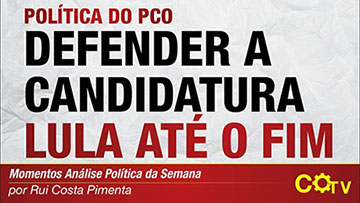 PCO:
more
Lulista than Lula.
PCO:
more
Lulista than Lula. The Partido Causa Operária (PCO – Workers Cause Party) is more or less the opposite of the PSTU. Its newspaper headlines, “Against the Violation of the Constitution: GO WITH LULA TO THE END” (Causa Operária No. 1021, 6 September). When the PT went along with the authoritarian veto of Lula’s candidacy by the Superior Election Tribunal (TSE), then quickly ratified by the STF, and proceeded to name the vice-presidential nominee on Lula’s slate, Fernando Haddad, as its candidate for the presidency, the PCO declared: “Haddad the Candidate: The Road to Submission” (Diário Causa Operária, 12 September). But these Lulistas-to-the-end ignore the letter of the former president transmitting his candidacy to the former mayor of São Paulo.
In fact, the PCO is more Lulista than Lula. It describes the scene in April, shortly after the announcement of Lula’s arrest warrant, as “thousands of people showed they were willing to react” around the country. However, “the directive from the [PT] leadership was to accept it and seek a way out by legal means.” Then when “people even closed the doors of the union HQ” (of the ABC Metal Workers Union3 so he could “hole up in a castle,” it says “the same voices, prevailed.” What the PCO does not admit is that the voice that prevailed was that of Lula, who made a lengthy speech professing his faith in Brazilian justice, because otherwise “I would have called for a revolution in this country.”
Lula governed Brazil for the PT for eight years in alliance
with right-wing bourgeois parties on behalf of the interests
of capitalists “who never in Brazil’s history made as much
money as they did when I was president.” Then he handpicked
his successor, Dilma, to continue his work.
Even after the impeachment, which he denounced as a “coup”, he
agreed to make political alliances with the “coup plotters”
and promised to reform the welfare system according to the
wishes of the bourgeoisie. The PCO has several candidates
running in these elections, but even while talking of
resisting electoral fraud in the streets, the party continues
to proclaim its support for Lula as president. The Liga
Quarta-Internacionalista do Brasil (LQB – Fourth
Internationalist League of Brazil) opposed impeachment, whose
purpose was to intensify attacks on the workers, but we have
never given political support to the PT or Lula, and we don’t
support Lulista candidates, because Lula’s
popular-frontism can only lead to a new disaster for the
working class and all the oppressed.
PSOL
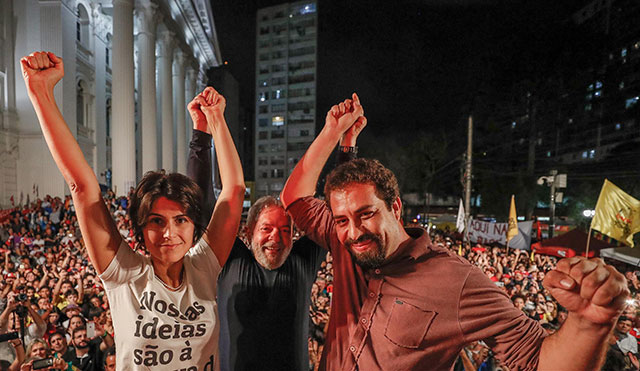
Manuela d'Avila of the PCdoB, now vice-presidential candidate on the PT's “Brazil Happy Again” slate, along with Lula and Guilherme Boulos, presidential candidate on the PSOL ticket in a popular-front rally "in defense of democracy" in Curitiba, the headquarters of Operation Lava Jato, April 2. (Photo: Ricardo Stuckert / Instituto Lula)
The largest group that places itself to the left of the PT, the Partido Socialismo e Liberdade (PSOL – Party of Socialism and Freedom), originated from a split from Lula’s party in 2004 after congressional dissidents were expelled for opposing Lula’s pension “reform” of that year, which slashed workers’ rights.4 The PSOL is a full-fledged social-democratic party, electoralist to the core, although it has only six deputies in Congress, no senator and only two mayors out of more than 5,000 in Brazil. Its main function is to divert leftists into bourgeois parliamentarism. Its leadership is a merry-go-round of the countless internal currents, among which the dominant bloc, Unidade Socialista (led by Ivan Valente’s Ação Socialista Popular), always imposes its “moderate” policy on the Left Bloc (made up of the MES of Luciana Genro; the CST of Babá; Resistência; Insurgência; the Coletivo 1° de Maio; LSR (Liberdade, Socialismo e Revolução); Esquerda Marxista, etc., etc.). In addition, there are “democratic affiliations” of other tendencies. In Brazil’s cities, which probably have the highest concentration of pseudo-Trotskyists per square kilometer in the world, almost all the tendencies are swimming in the swamp of PSOL.
If PSOL has functioned since its inception as a satellite of the PT, this has intensified with the impeachment of Dilma Rousseff and particularly during the 2018 election campaign. PSOL presidential candidate Guilherme Boulos, the leader of the Homeless Workers’ Movement (MTST), was with Lula constantly up until his arrest. In fact, when Boulos joined PSOL in March, this was greeted with video messages from Lula himself and prominent PT leader Tarso Genro. The government program for the slate supported by PSOL, the Brazilian Communist Party (PCB) and the Vamos platform (formerly the Frente do Povo Sem Medo [Fearless People’s Front]) is titled 50 Recipes from Boulos to Change Brazil. In 120 pages of “recipes” for a land of wonders there is not a single criticism of the PT-led popular-front governments of Lula and Dilma, which with their attacks on the workers opened the door to the right. It is a program for a capitalist government to return to the supposed golden age before Michel Temer was installed in the presidency in the Palácio do Planalto.
An earlier program for the PSOL candidacy (of the Coalition Let’s Go Without Fear to Change Brazil), consisting of 228 pages of fanciful “reforms,” raises some mild criticism of the economic policies of the PT governments and uses more “leftist” language. This “anti-system, popular, radical and anti-conservative program” outlines “a model of national development with broad societal involvement.” In reality, it only recycles the bourgeois politics of the “development state” dating from the mid-20th century, which are not coming back. Besides there not being an independent national bourgeoisie to implement such a program, the imperialists would not allow a challenge to their “neoliberal” policies of free trade, privatization and destruction of social programs, a policy necessary for their profits in this decaying capitalism.
Proof of the impossibility of an “alternative” economic policy within the capitalist framework as envisaged by the PSOL-PCB candidacy is the disastrous experience of the SYRIZA government in Greece. This bourgeois populist party which calls itself a “coalition of the radical left” won the elections in 2015 with a program to resist austerity, but after five months of theatrics ended up implementing the dictates of the bankers. The PT during its 13 years running Brazil always faithfully implemented the neoliberal policies dictated by the imperialists. A hypothetical PT government with a PSOL-PCB appendage tacked on would do the same, only this time with even more insistence.
In any case, the same PSOL signed a manifesto of “Unity to Rebuild Brazil” together with the PT, PCdoB and two capitalist parties, the Brazilian Socialist Party (PSB) and the Democratic Labor Party (PDT) in February. The PSB coalesced the cacique (regional political boss) and governor of the state of Pernambuco, Miguel Arraes, then served as electoral vehicle for the governor of the state of Rio de Janeiro, Anthony Garotinho, and later for Eduardo Campos, the grandson of Arraes. The PDT, founded by Leonel Brizola with a populist ideology inherited from the Brazilian Labor Party of Jango Goulart, is represented today by the presidential candidate Ciro Gomes, who for several years was a director of the privatized National Steel Company (CSN). His vice-presidential candidate is Kátia Abreu, the “queen of the chainsaw,” a faithful defender of agribusiness and head of the rural caucus in Congress. Thus the PT-PCdoB-PSB-PDT-PSOL bloc is a new popular front of class collaboration, which subordinates the labor movement and the left to the bourgeoisie.
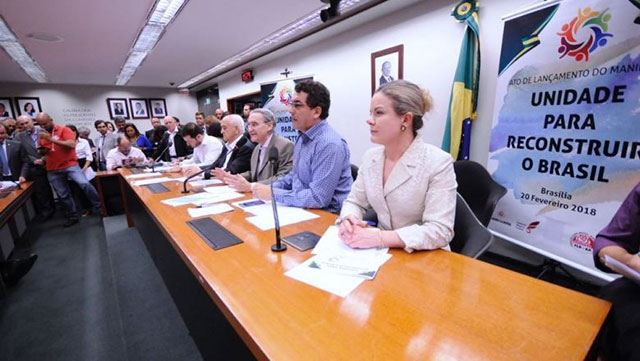
New popular front formed: meeting to present the manifesto “Unity to Reconstruct Brazil” signed by the PT, PCdoB, PDT, PSB and PSOL in Brasilia, February 20. Trotskyists call for proletarian opposition to the bourgeois popular front. (Photo: Alessandro Dantas / Sul21)
The manifesto, which was further refined in July, praised “the achievements of the progressive cycle of the Lula and Dilma governments from 2003 to 2016.” It pledges loyalty to the capitalist state, dubbed the “Democratic State of Law.” Its talk of promoting a “culture of peace and enhancement of life” is contradicted by its promise to strengthen the repressive apparatus with the “modernization and strengthening of the Armed Forces.” Its policy on “Public Security” (i.e., the police) is summarized as combining “prevention strategies” with “strategies of qualified coercion.” It talks of the “emancipation of women,” but says nothing about the right to abortion. It talks of “enhancement of labor”, but does not promise to revoke the awful “Labor Reform.” In short, its “rebuilt Brazil” will be the same old bourgeois state of capitalist exploitation, brutal repression and social oppression.
It is not surprising, then, that as the PSOL defends the PT governments of Lula and Dilma, voters prefer to vote for the PT directly, especially when thinking about casting a “useful vote” to defeat Bolsonaro. Thus in opinion polls in mid-September, preferences for PSOL candidate Boulos hovered around 0.4%. Esquerda Online (13 September), the site of the PSOL internal tendency Resistência, warns that “The Political Reform Can Cast PSOL Into Illegality.” According to the publication, the constitutional amendment passed by the National Congress last year is a “hardening of the regime that will eliminate ideological parties such as PSOL, PCB, PCO and PSTU.” Just how would it eliminate them? The new law has a “performance clause” which states that a slate must receive a minimum of 1.5% of the votes in elections for the House of Representatives in at least nine states in order to receive money from the Party Fund, along with and free radio and TV time. This would exclude almost all left slates. (The PSOL received 1.5% of the votes in the 2014 presidential election, the other parties much less.)
The LQB opposes this anti-democratic “reform” that certainly aims to preclude electoral campaigns of leftist parties, which are pejoratively called “midgets” by the bourgeois press. At the same time, we declare that every Marxist revolutionary should reject “public” party funding by the bosses’ state. According to TSE accounting, PSOL received more than R$12.5 million from the Party Fund in 2017 and R$7.2 million in the first six months of 2018, plus another R$21.4 million this year from the newly minted Electoral Fund for a total of over R$40 million, or US$10 million, a not insignificant sum.5 The anxieties expressed about possible “elimination” of PSOL come mainly from the fear of losing state funding if the vote for the slate falls below the 1.5% threshold. This underlines our warning that “a party that receives money from the capitalist state is a hostage of the bourgeoisie: its political campaign, and its very existence, depend on the good will of the apparatus which manages the affairs of the bosses” (“Brazil: The Election Racket of the Bourgeoisie,” The Internationalist No. 38, September-October 2014).
Within the PSOL there are some who are disgruntled over the campaign of Boulos and his vice-presidential running mate, Sônia Guajajara. Of the larger internal tendencies, in addition to Unidade Socialista, both Resistência and Insurgência now express full-throated support. Of the smaller currents, the LSR enthusiastically proclaims (24 August), “Let’s Go with Boulos and Guajajara!”6 However, others like the Esquerda Marxista (Marxist Left)7 are more critical. EM objected to Boulos’ statement that “it would be disrespectful” to present his candidacy “as an electoral alternative to Lula.” It also criticizes the noxious influence of capitalist state funding on the PSOL leadership’s maneuvers. Even so, EM states that “since Boulos was the candidate chosen by the party, we will be in the campaign defending our positions and making the necessary criticisms so that this candidacy is not an heir of Lulismo” (political resolution of the congress of Esquerda Marxista, 9 May). However, PSOL policy in these elections explicitly embraces the policy of Lulismo, and EM is campaigning for a class-collaborationist candidacy.
Undoubtedly, some will vote for PSOL thinking of Marielle Franco, the black city councilwoman who was murdered, along with her driver Anderson Gomes, due to her courageous denunciation of police massacres and the bloody military intervention in Rio de Janeiro (see “Racist Execution in Rio,” The Internationalist No. 51, March-April 2018). Some of Marielle’s close collaborators are running for office on the PSOL ticket in Rio. However, the fundamental fact is that the PSOL-PCB slate does not offer a means to express revolutionary opposition to capitalism, or even to give a strong class response to the bonapartist threat looming over the country. Every genuine Trotskyist must oppose the PSOL candidacy that forms part of the bourgeois alliance of the new Lulista popular front.
MRT
Another group that inhabits the wetlands bordering on the PSOL swamp is the Movimento Revolucionário de Trabalhadores (MRT – Revolutionary Workers Movement), the Brazilian section of the international Trotskyist Faction (FT), which publishes the Esquerda Diário site on the Internet. These right-centrists claim to have broken with the heritage of the tendency founded by Argentine pseudo-Trotskyist Nahuel Moreno, from which they originated in a 1988 split, a year after the master’s death. In particular, they say they reject Moreno’s anti-Trotskyist strategy of fighting for a “democratic revolution,” and not for socialist revolution. However, in practice, the FT and its Brazilian affiliate follow the “democraticist” and stagist politics inherited from Morenoism. They also continue its “frontist” practice of constantly making political blocs and electoral alliances. Instead of drawing a clear class line, they seek to push the policies of the reformists to the left. Rather than fight directly to forge a revolutionary vanguard, the FT, faithful to the Morenoite tradition, always tries to position itself as a left wing of whatever is the latest movement in vogue.
In the current elections in Brazil, the MRT has rightly criticized the exclusion of Lula as presidential candidate by the action of the judiciary. “We do not support voting for the PT,” it writes, but it defends “the right of the people to decide who to vote for” (Esquerda Diário, 28 August). At the same time, the MRT has launched its own candidates in São Paulo, Minas Gerais and Rio Grande do Sul on the PSOL slate, through a practice called “democratic affiliation”. Due to the undemocratic Brazilian electoral laws, they put candidates on the PSOL ticket, “without having a program in common with them” (“What Is Democratic Affiliation and Why Does MRT Use It?” Esquerda Diário, 6 August). However, even as it assures us that this “does not imply any political-programmatic agreement,” presenting itself in the PSOL ticket does imply certain political affinity. So naturally, at the last moment (October 5) the MRT called to vote for Boulos of PSOL. We of the LQB, in contrast, clearly state that we do not call to vote for this party that is part of a bourgeois popular front.
If the practice of the Militant current (progenitor of both the LSR and EM currents in the PSOL) is to engage in long-term entrism in mass parties – reformist or even bourgeois – the trademark of the Morenoite tendency (which is the origin of the PSTU, of the MEC, CST and the bulk of Resistência in PSOL, and of the MRT) is to hitch a ride on assorted petty-bourgeois movements and strata. Thus, in Mexico, for some time the section of the FT called on the Zapatistas to call general strikes, lead election campaigns, etc. In Brazil, during the battle over impeachment, the MRT was caught between the PSTU (and the Conlutas labor federation it leads) that gave “left” support to the right-wing “Throw Out Dilma” campaign, and a PSOL that gave left cover to the dying popular front led by PT. Ultimately, the siren song of the popular front proved irresistible, and the MRT came out “against the coup.” Since there was no actual break with the parliamentary institutions, it adopted the PSOL line of an “institutional coup”.
As we wrote at the time, “The PT left (PT, PCdoB, PCO and smaller groups) has identified the offensive against President Dilma Rousseff as a ‘coup.’ In itself, impeachment does not signify a break in the bourgeois democratic ‘order’.” To be sure, the impeachment was fraudulent and was aimed at intensifying the attacks on workers’ rights (which the PT governments had not been able to carry through to the end). But it was not the equivalent of a military takeover. Brazil has had 21 years of military dictatorship, and the removal of Dilma from the Palácio do Planalto was not the same as the overthrow of João Goulart. Pretending that impeachment by a corrupt congress, with all its low blows and dirty tricks, is the equivalent of a coup only embellishes capitalist “democracy.” The truth is that, as we wrote then, the course of the protests was a reflection of a “sinister bonapartist revolt brewing in the repressive organs of power against civilian authority,” and that the arbitrary arrest of Lula “was a notification on the part of the judicial and police apparatus that they were placing themselves above the representative and executive powers of the state.”8
That is why the LQB proclaimed at the time, “No To Impeachment! For Workers Mobilization Against the Bourgeois Rightist Offensive – No Political Support to the Bourgeois Popular-Front Government.” After impeachment won in August 2016, the authoritarian evolution of the regime continued under the command of President Temer. We are now in the midst of an election manipulated by the judiciary, with a ban on the candidate who would undoubtedly have been elected, with a military electoral slate (headed by ex-captain Bolsonaro and retired general Mourão) in the lead and threats from the armed forces chief of military intervention against “chaos” and to ensure “governability”. In the face of this menacing scenario, in which it can’t be ruled out that it could lead to a regime dominated by the repressive organs (military, police and judiciary), what is the response of the left? Apart from the PSTU puppets of the right wing, the bulk of the opportunist left is lining up with a new edition of the popular front of Lula and Dilma, the same regime that opened the way to the “coup.”.
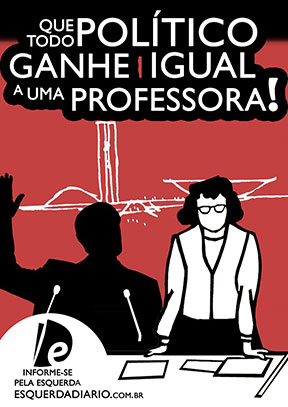 At the height of the
denunciations of corruption that dominated the bourgeois
political scene in 2015-2016, the MRT campaign demand that
“Every politician should get paid the same as a woman
teacher.”
At the height of the
denunciations of corruption that dominated the bourgeois
political scene in 2015-2016, the MRT campaign demand that
“Every politician should get paid the same as a woman
teacher.” When the MRT adopts the talk of a “coup,” it serves as the doorway for it to take up position in the environs of this class-collaborationist front. Of course these neo-Morenists, because they are centrists, criticize the new PT-PCdoB-PDT-PSB-PSOL front. In an article, “A Programmatic Debate with the Platform VAMOS, Base of the Candidacy of Guilherme Boulos” (Esquerda Diário, 2 April), the MRT criticizes its “lack of independence” from the PT. It criticizes how PSOL uses the slogan of “Every Politician Should Earn the Same as a Teacher,” noting that “measures of radical democracy” if “taken in isolation” could even be used to breathe life into a dying capitalist regime. But the same can be said of how the MRT used the very same slogan in its own 2015-2016 campaign. In a polemic against the PSTU and PSOL, it cites the Paris Commune and Lenin’s State and Revolution, but in the videos and propaganda for popular consumption they presented it as an isolated measure, not a word about revolution.9
Or take the example of the MRT’s preferred slogan in the current election campaign, don’t pay the public debt. That this is a key issue for any fight to defend social programs and workers’ interests is clear when one considers that interest payments, amortization and debt refinancing total almost 2 trillion reais (about US$500 million), or more than 50% of the federal budget.10 Esquerda Diário’s polemic against the VAMOS platform comments that measures envisaged in this platform, such as: “reversal of privatizations and nationalization of strategic sectors, or even a moderate measure like revising the interest on the foreign debt, would be met with deep speculative attacks against the national economy, capital flight, speculation against the currency, economic retaliation against Brazilian exports.” Therefore, the MRT writes, we need “a program for a revolution”. Exactly.
It’s just that such retaliatory measures by the imperialists would be even more forceful in the face of non-payment of the debt. When the Argentine government declared default in 2001 in order to restructure debt, international banks set up an economic boycott that did not stop until the Kirchner governments and finally Mauricio Macri agreed to pay the remaining total amount. But in the MRT campaigns in the current elections, you can watch a whole series of videos and electoral propaganda where there is no mention of revolution. The slogan is don’t pay, period. As we wrote in 2002:
“Thus in order to save the working people of Argentina from ruin, it is necessary not only to repudiate the foreign debt but also to expropriate the banks and the rest of the key companies in the country, something no capitalist government is about to do, whatever nationalist rhetoric it may employ. Even a revolutionary workers government would have enormous difficulty in the face of the inevitable reprisals by imperialism in carrying out these essential steps which require international socialist revolution.”
–“Mass Upheaval Rocks Argentina, Brazilian Workers Movement Under Attack,” The Internationalist No. 13, May-June 2002
 Symbols of the parties that in April
signed the popular-front “Manifesto for Democracy, National
Sovereignty and the Rights of the Brazilian People”.
Symbols of the parties that in April
signed the popular-front “Manifesto for Democracy, National
Sovereignty and the Rights of the Brazilian People”. (Photo: Brasil de Fato)
The MRT article criticizing the VAMOS platform refers to the “Manifesto to Rebuild Brazil” signed by PSOL together with the PT, PCdoB and the two bourgeois parties PSB and PDT. In April, the same parties signed, along with PCO and PCB, the Frente Brasil Popular and the Frente do Povo Sem Medo a “Manifesto for Democracy, National Sovereignty and Rights of the Brazilian People.” That Manifesto proclaims a “broad social front” to “defend democracy” and the “rule of law.”11 Curiously, the MRT does not characterize this alliance by its proper name in the Marxist lexicon, a popular front. That would recall the lessons of how the Popular Unity of Salvador Allende, by blocking workers revolution, paved the way for Pinochet’s coup. We revolutionary Trotskyists refuse to vote for parties that are part of a popular front, a bourgeois political formation. But the MRT only refers to “a front like this,” without specifying its class character, and instead of opposing it the PSOL, proposes an alternative front, such as the Front of Left and the Working People, or FIT, according to its initials in Spanish), in Argentina, “with a program for class independence and a government of the working people” (see our article, “The Left Front in Argentina: Reformist Electoral Cartel”).
The Argentine FIT “points to an alternate road for the left,” writes the MRT. We’ll see. Let’s first consider the slogan of the “government of the working people” (governo dos trabalhadores). This is not a workers government (governo operário), or a workers and peasants government, which for Trotskyists (and for the Bolsheviks in 1917) represents “nothing more than the popular designation for the already established dictatorship of the proletariat” (Trotsky, The Transitional Program). For the Marxists, the category of “working people” (trabalhadores) includes not only workers and poor peasants, but also broad sections of the petty bourgeoisie, and not just the poorest. In Brazil, the PT called its populist bourgeois government a “government of the working people”. Now let’s see how the MRT formulates the question. In a text analyzing the Manifesto for Democracy (Esquerda Diário, 19 April), it speaks of “imposing through the independent mobilization of the masses a Free and Sovereign Constituent Assembly that would bring to bear the will of the exploited and oppressed majority of the country.” It then adds:
“This would be a huge step forward in the struggle for a government of the working people that breaks with capitalism, based on their organizations of direct democracy, since it would allow broad sectors of the masses to overcome the illusions they still hold in bourgeois democracy.”
This is a stagiest conception – first a (bourgeois) constituent assembly, later a government of the working people – as well as democratizing, trying to squeeze class issues into a (bourgeois) democratic framework: the soviets were organs of workers power, not just “direct democracy.”12
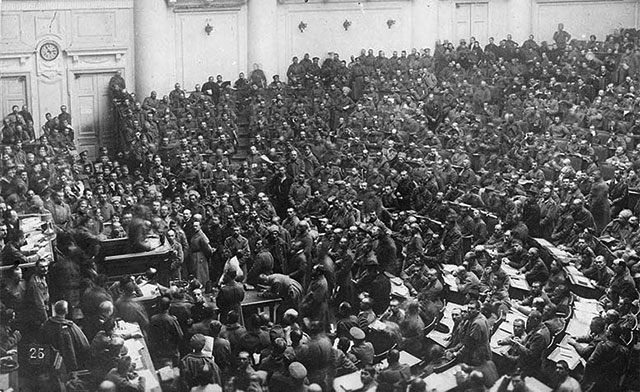
Petrograd Soviet, 1917. The soviets were not classless “organisms of direct democracy,” as the MRT claims, but organisms of workers democracy, which under revolutionary leadership became organs of proletarian power.
So what about “class independence”? The separation of a workers party from the parties and politicians of the bourgeoisie is the basis of all proletarian politics, as Marx underscored back in 1871. But it is only the starting point. A reformist workers party (what Lenin called a “bourgeois workers party”) may claim to be independent, competing for elections without alliances with bourgeois parties. This is what the British Labor Party and some European social-democratic parties usually do. However, in this era of decaying imperialism, when past gains are being systematically destroyed, a policy of reform is doomed to failure. Thus a reformist electoral front like the Argentine FIT cannot advance the struggles of the workers and the oppressed. That requires a revolutionary workers party, whose program is openly directed at the overthrow of the bourgeoisie and the seizure of power by the proletariat and its allies. The campaigns of the Trotskyist Fraction, in contrast, are centered on democratic demands, such as their “Free and Sovereign Constituent Assembly,” when it’s necessary to fight for a government based on workers councils.
All the electoral politics of the MRT, and of the FT in general, stem from this “democratic” approach, derived from Morenoism. Instead of combatting the PSOL as an obstacle to the struggle for the socialist revolution, they make “fraternal” suggestions that it should call for non-payment of the public debt, or a constituent assembly. Or that PSOL should call for “recall of all senior posts, an end to privileges, that every politician or state official should earn the same as a teacher or skilled worker,” all in the interest of ... “a true democracy.” So there is a certain logic for MRT candidacies running on the PSOL ticket. Let’s not forget that the MRT applied for admission into the ranks of this popular-frontist and social-democratic party to form another of the more than a dozen internal tendencies. It was only left out in the cold due to the rejection by the PSOL leadership, which ever since the impeachment battle has been increasingly pulled into the orbit of Lulaism. The MRT seeks to pressure the popular-frontists, positioning itself one step to the left. In this way it, too, revolves around the PT, as an “external tendency of PSOL.”
The reasoning of these neo-Morenoite pseudo-Trotskyists is that brandishing a series of democratic demands would serve to reveal the limits of bourgeois democracy. But with their democratist politics they are creating democratic illusions . What’s true is that for most working people their present consciousness does not go beyond reforming the capitalist system, and this in the midst of a furious media campaign against “corruption.” That campaign is fanned by the corrupt bourgeois right-wing, and orchestrated by sinister forces of the judiciary and the military/police apparatus. It aims to crush the PT, worn down through 13 years in power defending the profits of the banks and the interests of the bosses to the detriment of the rights of the workers that it claims to represent. But rather than having vivid democratic illusions, working people instead tend to be disillusioned with the misleading promises of bourgeois “democracy” (what the MRT calls “democracy of the rich,” a populist, not a class formulation). To claim to rectify the system of bribes and vote buying, which are endemic in Brazilian politics, by reducing the salaries of members of Congress and judges is absurd. It will take a revolution.
Moreover, with its “democratist” campaigns, the MRT participates in the “anti-corruption” offensive fueled by imperialism, as do the PT, PSOL, PSTU and almost the entire left. That offensive is orchestrated by the United States, with training of judges such as Sérgio Moro (Lava Jato) and the multi-faceted network of U.S.-funded consultancies, observatories and other NGOs to monitor the “transparency” of governments, issue certificates of “clean elections,” and the like. But “corruption” is inherent in capitalism. As we wrote during the mensalão scandal (of monthly payoffs to the PT’s bourgeois allies in Congress):
“Corruption is a constant in bourgeois politics. It is the axle grease that makes the gears of the capitalist state machinery function, so that the government of the day can serve as the executive committee of the ruling class, meshing the interests of its different factions. It particularly annoys the “proper” petty bourgeoisie and social-democratic reformists because it reveals the dirty reality behind the mythology of the “neutrality” of the state, providing concrete proof of how this state defends the interests of capital, not of ‘everyone’….
“Revolutionaries are not shocked by corruption in politics, because we know that this is an integral part of the capitalist system that we combat in all its facets. We denounce all capitalist financing of a workers party, whether illegal or legal under bourgeois law, as well as opposing “public” financing, which is nothing but a mechanism for controlling the recipients of the funds.”
–“Lula Against the Workers – Forge a Revolutionary Workers Party!,” The Internationalist, May 2006
Today the MRT criticizes the PT for having voted for the Ficha Limpa (Clean Slate) law, which was then used to bar Lula from the election contest. However, the PSOL (on whose ticket the MRT candidates are running) was the champion of Ficha Limpa, with PSOL deputy Chico Alencar being the staunchest defender of this law that gives the bourgeois judiciary a dictatorial power over who can be a candidate. The MRT in the past characterized the Ficha Limpa as a “popular achievement.” But the MRT does not criticize the financing of parties by the capitalist government, which gives it decisive power over the election activity of the left. And, of course, the FIT in Argentina finances its electoral campaigns with funds from the state.
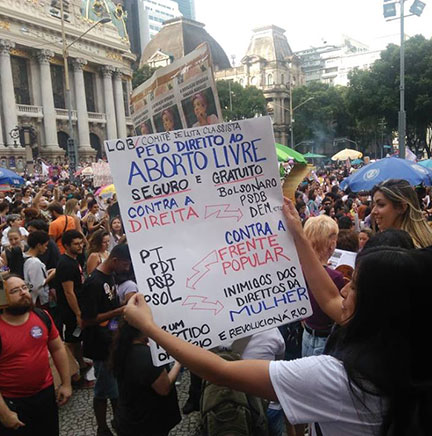 The Liga Quarta-Internacionalista insists that
the struggle for women’s rights requires a class struggle
against the right and the popular-front left. Forge a
revolutionary workers party! (Photo: LQB)
The Liga Quarta-Internacionalista insists that
the struggle for women’s rights requires a class struggle
against the right and the popular-front left. Forge a
revolutionary workers party! (Photo: LQB)As for the crowning demand of the democratic program of the MRT, the Constituent Assembly, such a bourgeois body would not solve anything of the oppression of the workers and the poor, which is a matter of class domination. The 1988 constitution was negotiated under the pressure of the military, and because of that pressure contains Article 142 that allows for military intervention at the request of “constitutional powers” (executive, legislative or judicial). What makes one think that in the present political conditions a new constituent assembly would result in a more democratic constitution, free of military tutelage? Or that it would prevent privatization “reforms”? Or that it would legislate the unrestricted right of women to free abortion on demand? The PT itself, in its program of government, calls for a new “constituent, free, democratic, sovereign and unicameral national assembly.” It is an ABC of Trotskyism and the theory of permanent revolution that in our imperialist era of decaying capitalism even the most basic democratic rights can only be won by the proletariat’s seizure of power and the international socialist revolution.
And this has to be made explicit at all times. If not, as the MRT does in its campaigns, one would be peddling lies and illusions. These centrists are not naive, they don’t believe that their new imagined constituent assembly would result in such bountiful democratic conquests. What they think is that by fighting for these demands and being defeated, the masses would then become radicalized. In a recent article (“We Fight for a Constituent Assembly to Confront the Institutional Coup,” Esquerda Diário, 28 September), the MRT writes that seeing that “any measure really favorable to the interests of the majority of the population” is blocked would be “an experience that will advance the understanding of the need to fight for a government of the working people that breaks with capitalism.” Aside from the cynicism of appealing for something knowing that it will fail, this is a bad method. The primary reaction to such a defeat would be disappointment and demoralization.
In addition to the particular programs of the leftist parties in these elections, what stands out is the electoralist nature of their campaigns. Every two or four years, the left loses interest in workers’ struggles to instead focus on electioneering. And when a struggle arises, such as the truckers’ strike last May, much of the left approaches it from a purely electoral perspective (in this case, by dismissing the strike as a “lockout” and rightist maneuver). The axis of the “electoral” program of any authentic revolutionary Trotskyist would be to intensify the mobilization of the working people and the poor. This should be the powerful response to the bourgeoisie’s attacks on our rights, against the militaristic danger, and against these elections. ■
- 1. “Supreme Court Denies Habeas Corpus and Lula’s Arrest Is Ordered,” statement of the PSTU, 5 April.
- 2. See “Brazil’s Opportunist Left Tailing After the Bourgeois Blocs,” The Internationalist No. 44, Summer 2016.
- 3. Referring to the industrial triangle between Santo André, São Bernardo dos Campos and São Caetano do Sul in São Paulo state, where many automobile and auto parts plants are located.
- 4. See our article, “We Don’t Need a Social-Democratic ‘New Party’ of Disillusioned Lulistas,” (The Internationalist No. 20, January-February 2005).
- 5. Sources: http://www.justicaeleitoral.jus.br/arquivos/tse-distribuicao-do-fundo-partidario-2017 and http://agenciabrasil.ebc.com.br/politica/noticia/2018-08/partidos-receberam-r-13-bilhao-para-financiar-campanha-eleitoral. The PSTU received R$2.4 million in 2017 and R$1.3 million in the first six months of 2018. The PCO received a little over R$1 million in 2017 and another R$600,000 in the first half of 2018.
- 6. The utter lack of a class outlook on the part of the LSR and its international tendency, the Committee for a Workers International (CWI) of Peter Taaffe, was shown by its applause for “AMLO’s Historic Victory” in Mexico (2 July), that is, of the populist bourgeois politician Andrés Manuel López Obrador. In the United States, the LSR trumpeted “Socialist Victory Shakes the Establishment” (11 July), referring to the victory of Alexandria Ocasio-Cortez in the Democratic Party primary election. The chief spokeswoman for the CWI affiliate in the US, Socialist Alternative, is Seattle city councilor Kshama Sawant, who recently voted for the municipal police chief (see “SAlt’s Sawant Backs Seattle’s Top Cop,” Revolution No. 14, September 2018). For the CWI, as for the PSTU/LIT, policemen, the guard dogs of capital and iron fist of bourgeois repression, are supposedly “workers in uniform”!
- 7. Esquerda Marxista is affiliated with the International Marxist Tendency (IMT) of Alan Woods, and joined the PSOL in 2015. Today it lectures about the need for the PSOL to break alliances with bourgeois parties, without mentioning its own long history in the O Trabalho tendency within the PT, when it led the bourgeois popular-front government. Or that in Mexico, its affiliate, Militante, was for many years part of the PRD (Partido de la Revoluci6n Democrática), a bourgeois populist party. More recently, the Mexican section of the IMT, Izquierda Socialista (IS), welcomed AMLO’s victory in the July 1 elections as a “political earthquake”, a “tsunami” and an “insurrection at the polls” which meant a “great injection of morale, joy and confidence into their own forces.” The IS characterizes the new government as “reformist” rather than bourgeois, criticizing leftists who “are upset at the triumph of AMLO,” and states that “Our task, instead, is to support the progressive measures of AMLO” (“The Future Government of AMLO and the Tasks of the Marxists,” 15 July). That is, Esquerda Marxista/IMT defends the same pro-bourgeois policy of Stalin and Kamenev that Lenin had to fight against in his famous “April Theses” in order to open the way to the October Revolution, whose centenary we celebrated last year.
- 8. “For Class Struggle Against the Bonapartist Threat in Brazil,” The Interntionalist No. 43, May-June 2016.
- 9. See http://www.esquerdadiario.com.br/Campanha-Esquerda-Diario.
- 10. Debt payment: R$ 1.72 trillion, or 50.4% of total federal expenditures in 2017; R$1.85 trillion, or 52.3% of the budgeted expenses for 2018, almost double the outlay for social assistance, social security, health and education. See http://economiaetrabalho.com.br/2017/orcamento-com-a-divida-aumenta-r-500-bilhoes-3713-restante-do-orcamento-aumenta-r-819-bilhoes-511/
- 11. “Opposition Parties Launch Manifesto In Defense Of Democracy” Brasil de Fato, April 18.
- 12. On the policy of the Trotskyist Fraction of calling for constituent assemblies almost everywhere on the planet, see our article, “Trotskyism vs. ‘Constituent Assembly’ Mania,” in The Internationalist No. 27, May-June 2008.
